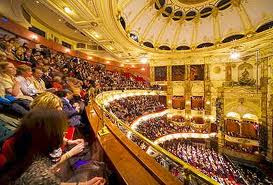
We got dressed up, grabbed a bus, and headed to the opera house. Called the London Coliseum, it is a beautifully ornate theater with 4 levels of seats totaling 2,153, dating back to 1904. Although our seats were on the top level, the sound is such that one can hear from any location. Feeling almost on top of the stage, our seats allowed us to see down into the pit where a large orchestra resided for the opera performance. The opera was Tales of Hoffman by Jacques Offenbach (1819-1880), a German born French composer of light opera. The opera is based on the stories of E.T.A. Hoffman who is also the main protagonist of the opera. Actually three separate stories in three acts with a kind of rounding out of the first story, Tales of Hoffman is a very successful opera with great demands on the singers and the orchestra.

Are there substantial differences between musicals and operas? I do not think so. Some may say that opera is primarily sung not spoken but the same can be said of Phantom of the Opera and Les Miserables. Candide, the marvelous opera by Leonard Bernstein, has extensive spoken dialog as does Mozart's masterful The Magic Flute. Some may say that musicals have lighter thematic material than opera, but in truth, it is hard to find heavier themes than Oliver! by Lionel Bart, or Sound of Music by Rodgers and Hammerstein or hard to find lighter themes than Gilbert and Sullivan or Franz Lehar. Maybe some may try to argue that opera uses greater craft of musical language or exercises a "classical" model than do musicals, but this is weak upon careful analysis of the actual music. In point of truth, there are stunning harmonies found in Cole Porter, Leonard Bernstein, and Frederick Lowe, and quite simple construction found in Verdi, Puccini, and Rossini.
But there is one shining difference, and that difference is slowly being eroded as well both in opera and musicals of today: amplification. We have a clash of ideals that extends beyond the question of what is opera and operates at the core of what music is and what academic training seeks to substantiate. What are the roles of electronic amplification, microphones, speakers, woofers, frequency adjustment, compression, channels, boards, in an acoustic environment? Is an all acoustic, non-artificial musical production the ideal? Is academic training solely about the acoustic world of natural instruments (including the voice) without any kind of artificial enhancement? Should it be? Is a study of rock/pop music actually a study, at least partially, of artificial, electronic power for the sound?
These two worlds are clashing and have done so for over 50 years as academic musicians, art music, classical music, and tradition battle with current trends in amplification and sound management. As I have mentioned before, much of this is due to architecture and space used in performance. In an acoustically pure environment, no electronic enhancement is needed. But in a flawed sound space, electronics are necessary for balance and for emotional impact. Dynamic range is easily accomplished in a cathedral but difficult to manage in a hall filled with carpet. Performing Beethoven or Mozart with sub woofers and constant sound board alterations is both an affront to the past and anathema to the purity of the music.
Yet performance space has changed and with it people have altered their expectations. In response to the opportunities for artificial sound, we have seen the development of popular and rock music in secular and sacred cultures. But at the same, we have seen great resistance to sound enhancements and an embracing of the heritage of acoustic, naturally produced music. These two ideals rage in battle in our musical culture each day. Will there be a winner or can the two co-exist successfully? In London, they both remain active with rock music and musicals benefiting from the artificiality of electronic enhancements, and with chamber music, opera, and orchestras gaining from music spaces that allow for great personal expression without any amplification.
As for me, I can live comfortably in both worlds and can embrace the philosophy of each without it detracting or minimizing the other. The opera, Tales of Hoffman, in its purity of no microphones or electronics of any kind was as terrific as was Wicked with all its effort at electronically balancing the sound of instruments and voices. What I desire, and it may be Utopian, is a recognition of the value of each ideal and the discernment to know when to use one or the other. Just as there are many styles of music and many different environments for making music, there are many ways to treat sound. It is necessary and vital to know something about the acoustic world of music and the electronic world of music. Both have a place in today's world and both have worth in academic and non-academic settings.
No comments:
Post a Comment